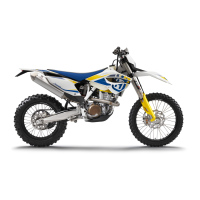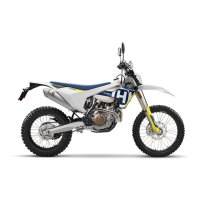Do you have a question about the Husqvarna FE 501 USA and is the answer not in the manual?
Explains the meaning of specific symbols used in the manual for warnings and information.
Explains the typographical formats used in the document for clarity and consistency.
Specifies the intended use and limitations of the Husqvarna sport motorcycles.
Defines danger levels and associated symbols for warnings and safety alerts.
Covers safe operation practices, including influences, environmental concerns, and rider responsibility.
Emphasizes the importance of wearing appropriate protective clothing for rider safety.
Details warranty conditions, voiding clauses, and service requirements.
Guides on the use of operating fluids and substances, including environmental warnings.
Highlights the importance of correct service and tuning for preventing wear and damage.
Illustrates and labels key components visible from the front left side of the motorcycle.
Illustrates and labels key components visible from the rear right side of the motorcycle.
Explains where to find the chassis number stamped on the motorcycle for identification.
Specifies the location of the engine number on the left side of the engine for identification.
Describes the clutch lever's location and hydraulic operation for engaging the clutch.
Explains the location and function of the hand brake lever for activating the front brake.
Details the function and possible states of the kill switch for engine shutdown.
Details the location and operation of the electric starter button for engine ignition.
Explains the meaning of various indicator lamps on the dashboard for system status.
Explains the location and function of the idle speed adjusting screw for engine idle control.
Details the location and use of the side stand for parking the motorcycle.
Explains the function and use of the steering lock for securing the vehicle.
Identifies the components of the speedometer display and control buttons.
Describes possible messages displayed on the speedometer and their meanings.
Guides on setting units, clock display, and service intervals on the speedometer.
Explains how to view speed, time, and trip distance on the speedometer.
Provides essential advice and checks for the initial use of the motorcycle.
Guides on proper engine running-in procedures to ensure longevity and performance.
Offers advice for operating the motorcycle in various challenging terrains and conditions.
Lists essential pre-ride checks and maintenance tasks for safe operation.
Provides instructions and safety precautions for starting the engine.
Explains gear shifting techniques and general riding advice for smooth operation.
Covers braking techniques and safety warnings to prevent wheel lock-up and ensure effective stopping.
Details safe refueling procedures and warnings for the fuel tank.
Outlines regular maintenance tasks at specified intervals for optimal performance and longevity.
Explains how to adjust suspension settings based on rider weight for optimal handling.
Guides on adjusting the low-speed compression damping for improved ride comfort.
Provides instructions for adjusting the spring preload for ride height and sag.
Explains how to adjust the compression damping of the front fork for desired stiffness.
Guides on adjusting the rebound damping of the front fork for controlled suspension response.
Instructions for safely raising the motorcycle using a lift stand for maintenance.
Steps for removing the front fork legs from the motorcycle for service.
Guides on installing the front fork legs correctly after service.
Explains how to check for play in the steering head bearings for safe handling.
Guides on adjusting the steering head bearing play for proper handling and safety.
Instructions for removing the fuel tank, including safety warnings regarding fuel.
Instructions for cleaning the air filter and its housing to ensure proper engine air intake.
Provides steps for adjusting the drive chain tension correctly for optimal power transmission.
Instructions for inspecting the motorcycle frame for cracks or deformation.
Instructions for checking the thickness and condition of brake discs for effective braking.
Guides on adding front brake fluid, with safety warnings about fluid handling.
How to check the minimum thickness of front brake linings for safe braking performance.
How to check the brake fluid level in the rear brake reservoir.
How to check the minimum thickness of rear brake linings for safe braking performance.
Steps for removing the front wheel, including brake caliper adjustment.
Guides on installing the front wheel correctly, including bearing checks.
Guides on checking and setting correct tire air pressure for optimal performance and tire life.
How to check and correct spoke tension for wheel balance and integrity.
Guides on correctly installing the motorcycle battery, ensuring proper connection.
Instructions and precautions for charging the motorcycle battery to maintain its health.
How to replace the main fuse, with warnings about electrical system overload and correct amperage.
How to check and verify the headlight beam alignment for visibility and compliance.
Instructions for adjusting the headlight beam angle for optimal road illumination.
How to check antifreeze protection and coolant levels for engine temperature regulation.
Steps for safely draining the coolant from the cooling system for maintenance.
Guides on adjusting the throttle cable play for smooth operation and responsiveness.
Instructions for setting the correct engine idle speed for smooth engine operation.
Steps for replacing the fuel screen, including safety warnings regarding fuel handling.
Detailed instructions for changing engine oil, filter, and cleaning oil screens for engine health.
Guides on adding engine oil, with warnings about premature wear from low or poor-quality oil.
Procedures for cleaning the motorcycle, with warnings about pressure washers and component damage.
Steps for preparing and storing the motorcycle for extended periods to prevent damage.
Procedures for getting the motorcycle ready for use after a storage period.
Possible causes and actions for when the engine fails to crank.
Possible causes and actions for when the engine cranks but does not start.
Possible causes and actions for engine overheating issues.
Lists blink codes for the FI warning lamp and their corresponding error conditions.
Lists technical specifications related to the motorcycle's engine.
Provides torque values for various chassis fasteners for correct assembly.
Specifies the standard and guidelines for using brake fluid.
Guidelines and mixture ratios for coolant to maintain engine temperature.
Standard classification and guidelines for SAE 10W/50 engine oil.
Guidelines and warnings for using unleaded super fuel.
Recommends a supplier for high viscosity grease used in lubrication.
Explains the JASO T903 MA standard for motorcycle engine oils.
| Brand | Husqvarna |
|---|---|
| Model | FE 501 USA |
| Category | Motorcycle |
| Language | English |











